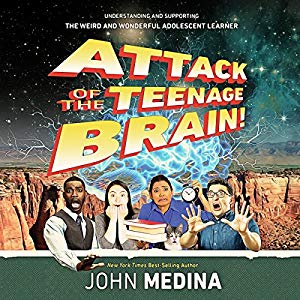John Medina’s books have been a gateway drug for many a brain-focused teacher.
(Like so many others, I myself was introduced to the field by his book Brain Rules.)
His most recent book, Attack of the Teenage Brain!, joins a growing list of very helpful authors focused on adolescence and adolescents. (For instance: Sarah-Jayne Blakemore and Lisa Damour.)
Medina offers many suggestions: you can read about them here.
One in particular stands out for its combined wisdom and audacity: educating parents.
Follow the Logic
Medina follows a straightforward logical chain to his audacious proposal. It goes like this:
To succeed academically, high school students need extra high doses of executive function (EF). Sadly, because of the neurobiological tumult of adolescence, the various neural networks that allow for EF struggle to get the job done.
All that myelination, all that blooming and pruning: it can add up to a cognitive muddle that we call “teenage behavior.”
Given a) the importance of executive function, and b) the difficulty of EF during adolescence, what can we do to give our teens a boost?
Sidebar: Defining Executive Function
Because we hear so much about EF, you might think that everyone knows what it is.
In fact, you might have noticed that everyone’s list of executive functions is different — and worry that you’re the only one who doesn’t understand why.
Don’t fear; it’s not you. Definitions of EF vary widely.
Medina boils executive function down to three key features: working memory, self-control/inhibition, and mental flexibility. (That last one creates all sorts of room for definitional variety. So: planning, organizing, task-switching, prioritizing, strategically postponing…you get the idea.)
To strengthen executive function, we can’t really improve working memory. But, we might be able to help with self-control and mental flexibility. How might we do so?
Parenting Matters: So, Try Educating Parents
Medina devotes chapter 4 of Attack to research on parenting and EF. We have all sorts of research to show that the right kind of parenting boosts executive function, and the wrong kind undermines it.
If good parenting enhances EF, we might improve high school learning by promoting the right kind of parenting. His big hairy audacious suggestion: “a night school annex for parents.”
As Medina writes:
“The argument for creating such a program is rooted in a blunt observation: most adults are woefully unprepared to rear children.” (p. 105)
Simply put, the “right kind of parenting” can indeed be taught. It’s called “authoritative” parenting — contrasted with “indulgent,” “indifferent,” and (unhelpfully) “authoritarian” parenting.
Medina’s parenting annex would teach authoritative parenting, thereby improve teens’ EF, and thereby enhance their learning.
Objections, and Answers
Objection #1: who are you to define “the right kind of parenting”? Is my parenting wrong just because you say so?
Answer: Medina walks his readers through lots of research on this question. The short answer: “the right kind of parenting” results in healthy and effective adults.
“Permissive” or “authoritarian” parenting isn’t bad because Medina (and Laurence Steinberg) say so. It’s bad because children parented that way struggle as adults.
You might not agree with their answer, but that’s what they say.
Objection #2: A night school annex for parents? Let’s be practical: how on earth would that work? The money. The time. The curriculum. The headaches.
I mean, really?
Answer: Medina has a curriculum answer, but leaves the other questions for another day. If we as a society ever agree to tackle this problem, we’ll find the money. We’ll fix the headaches.
In brief: when we decide that educating teens calls for educating parents, we will get the job done.




